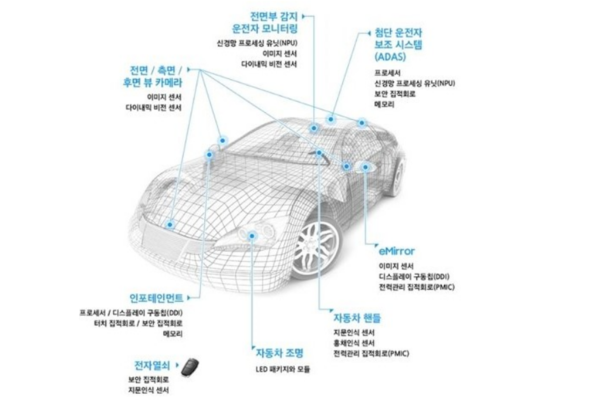Input 2021.01.24 06:00
Level 3 autonomous vehicle, requires 2000 semiconductors or more
車 pushed back to PC and home appliances, production disruption inevitable

According to KOTRA on the 24th (KOTRA, Korea Trade-Investment Promotion Agency), the number of semiconductors currently on the market is about 200-300, but more than 2,000 semiconductors are installed in autonomous vehicles of Level 3 or higher that do not require a steering wheel It was expected to be necessary.
The government sees this year as the first year of self-driving cars. Deputy Prime Minister of Economy and Ministry of Strategy and Finance Hong Nam-ki said at the 3rd Innovation Growth BIG3 Promotion Meeting on the 21st, “This year, global automakers’ competition for the launch of passenger cars applying 3rd stage (level 3) autonomous driving technology and 4th stage autonomous driving development will be in full swing “It has been said.
Vehicle semiconductors are regarded as essential elements of future vehicles such as autonomous vehicles. The semiconductor mainly mounted on vehicles is a non-memory semiconductor. Unlike memory semiconductors used for information storage, they are manufactured for the purpose of operations and inferences to process information. In Korea, it is mainly called’system semiconductor’.
Lee Hang-gu, a researcher at the Korea Automobile Research Institute, said, “As eco-friendly vehicles such as electric vehicles are increasing in addition to self-driving vehicles, the number of semiconductors applied to vehicles is increasing.” According to Starista, a global market research organization, the global automotive semiconductor market is expected to increase from $45 billion last year (about 49 trillion won) to $175 billion (about 193 trillion won) in 2040.
The global automotive semiconductor market is dominated by some foreign companies such as NXP in the Netherlands, Texas Instruments in the US, Infineon Technology in Germany, Renesas Electronics in Japan, and STMicroelectronics in Switzerland. “Unlike memory semiconductors mainly used indoors such as computers, vehicle semiconductors are used indoors and outdoors, and temperature fluctuations are severe,” said Kim Yangpaeng, a researcher at the Industrial Research Institute. “Because of this sector, reliable companies continue to lead the market.”
This is the background of constant observation that Samsung Electronics will take over NXP, the world’s number one automotive semiconductor company, last year. In particular, some observers say that it is necessary to acquire a vehicle semiconductor company for synergy with Harman, which is the number one in the electronics business, which was decided to take over in 2016. When Samsung Electronics announced its investment plan worth 180 trillion won in August 2018, it selected automotive electronics as future food along with AI (artificial intelligence), 5th generation communication (5G), and bio.
At present, the domestic and foreign automakers are suffering from the shortage of automotive semiconductors. Ford and Chrysler in the US, as well as Volkswagen and Audi in Germany, are in a position to worry about factory shutdowns and production disruptions. The dominant analysis is that this is because automotive semiconductors have pushed their production rankings to memory semiconductors.
In the aftermath of the new coronavirus infection (Corona 19) last year, sales of information technology (IT) products such as PCs and smartphones and home appliances such as TVs increased. On the contrary, demand for finished cars declined. Accordingly, production facilities such as semiconductor consignment production (foundry) have been increasing the production of memory semiconductors, but a sudden increase in demand for automobiles caused a discrepancy in demand. In addition, it is analyzed that automotive semiconductors have a smaller margin compared to memory semiconductors. An official in the domestic electronics industry said, “All foundry factories are currently operating at 100%, but as demand for semiconductors increases regardless of industry, the poor and the rich are intensifying by industry.”
Researcher Yangpaeng Kim said, “The lack of semiconductors for vehicles will not hinder the development of autonomous driving technology, but the production of autonomous vehicles may be delayed.”
